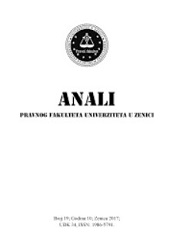ODLAGANJE RADIOAKTIVNOG OTPADA
DISPOSAL OF RADIOACTIVE WASTE
Author(s): Larisa Velić, Ismet VelićSubject(s): Energy and Environmental Studies, Environmental and Energy policy, Human Ecology
Published by: Pravni fakultet - Univerzitet u Zenici
Keywords: Nuclear waste; environment; environmental impact; international instruments; dispute resolution;
Summary/Abstract: Projects in the energy sector occupy a special place, and one of their most important elements are sources in the form of nuclear power plants, which produce a high percentage of electricity. This is accompanied by negative and harmful consequences, for the environment and people due to the generation of radioactive waste and spent nuclear fuel, which requires permanent disposal and isolation from the environment. Issues of environmental protection, interstate cooperation and dispute resolution are regulated by international instruments, including the Espoo Convention on Environmental Impact Assessment in a Transboundary Context, the Stockholm Declaration on Environmental Protection, the Convention on Access to Information, Public Participation in Decision-Making and Justice in Environmental Matters and national regulations. In terms of these regulations, the International Court of Justice in The Hague and the Arbitral Tribunal have jurisdiction to resolve disputes. The first nuclear power plant in the former Yugoslavia was built in the Republic of Slovenia in Krško, as a co-ownership of the Republic of Croatia and the Republic of Slovenia. The problem for Bosnia and Herzegovina is the planned location for the storage of radioactive waste of the Republic of Croatia in the area of Trgovska gora, in the immediate vicinity of the border in the Una river basin, in the area of the National Nature Park. In doing so, Croatia did not adequately involve Bosnia and Herzegovina in the site selection process, and the competent institutions of Bosnia and Herzegovina did not take concrete actions in the manner prescribed by the provisions of the Espoo Convention. The conclusion is that in connection with the mentioned disposal of radioactive waste, diplomatic activities must be intensified, and in parallel, actions must be taken in order to participate in the process of environmental impact assessment. Likewise, in order to resolve the dispute, it is necessary to provide the necessary preconditions for conducting proceedings before the Tribunal or ad hoc arbitration.
Journal: Anali Pravnog fakulteta Univerziteta u Zenici
- Issue Year: 14/2021
- Issue No: 29
- Page Range: 13-34
- Page Count: 22
- Language: Bosnian

